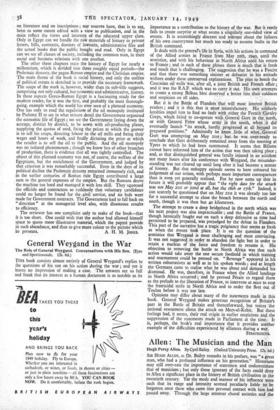General' Weygand in the War
The Role of General Weygand. Conversations with His Son. (Eyre and Spottiswoode. 12s. 6d.) THIS book consists almost entirely of General Weygand's replies to the questions of his son on his action during the war ; and yet it leaves no impression of making a case. The answers are so full and frank that its interest as a human document is as notable as its
importance as a contribution to the history of the war. But it rarely fails to create surprise at what seems a singularly one-sided view of events. It is astonishingly discreet and tolerant about the failures of his own countrymen but much too ready to assume faults in the British command.
It deals with the general's life in Syria, with his actions in command of the Allied armies in France from May loth, 194o, until the armistice, and with his behaviour in North Africa until. his return • to France; and in each of these phases there is much that is fresh and much that is challenging. The suggestion that he was a Fascist and that there was something sinister or defeatist in his attitude withers under these unreserved explanations. The plan .to bomb the Caucasian oil wells was, after all, a joint British and French affair ; and it was the R.A.F. which was to carry it out. His ooh attempts to create a strong Balkan bloc deserved a better fate than coldness and suspicion on all sides.
But it is the Battle of Flanders "'that -will most interest British readers ; and it is this that is most unsatisfactory. His soldierly loyalties impel him to find no fault' with either the French Cavalry Corps, which failed to co-operate with .General Gort in the, north, or with General Frere whose arm.y, in the, south, when at did eventually launch its attack, hardly progressed at all .heyOnd its prepared positions." Admittedly he Knew. , little of what,deneral Gort was attempting on May 21st; but he was over- ,:ready to conclude that Gort deliberately remained away from the meeting at Ypres to which he had been summoned. It seems that Billotte cannot have informed him of the action that was then taking place ; and, as that distinguished general was fatally injured in an accident not many hours after his conference with Weygand, the misunder- standing was not cleared up until long after it had become a matter of history. But that unhappy episode seems to haye coloured his judgement of our action, with perhaps more important consequences than is even yet generally realised. For he now sums up that in future it will 'probably appear that "the right date for the attack was not May 21st or 22nd at all, but the 16th or 17th." Indeed, it can scarcely be questioned that on May 21st it was already too late for a successful attempt to close the breach between the north and south, though it was then but 4o kilometres.
The attempt to create a deep bridgehead in the north which was his next project was also impracticable ; and the Battle of France, though heroically fought out on such a deep defensive as time had permitted to be prepared, was prejudged by the defeat in Flanders. This part of the narrative has a tragic poignancy that seems as fresh as when the events took place. It is on the question of the armistice that Weygand is most challenging and most convincing. It was not suggested in order to abandon the fight but in order to retain a nucleus of the force and freedom to resume it. His objection to removing the battle to North Africa was that such action would take away the one secure foothold in which training and rearmament could be pressed on. "Revenge " appeared in hit written exhortations as well as in his spoken words ' • and at length the Germans came to realise what he was about and demanded his dismissal. He was, therefore, in France when the Allied landings in North Africa occurred ; and he pressed Petain to regard them as the prelude to the liberation of France, to intervene at once to stop the fratricidal strife in North Africa and to order the fleet out of Toulon before it was too late.
Opinions may differ about many of the statements made in this book. General Weygand makes generous recognition of Britain's part in the Battle of Britain and thenceforward, but voices the national resentment about the attack on Mers-el-Kebir. But these feelings had, it seems, their real origin in earlier suspicions and, the suppression of the statements made in Parliament at the time. It is, perhaps, the book's real importance that it provides another example of the difficulties experienced by alliances during a war,
STRATEGICUS.


































 Previous page
Previous page